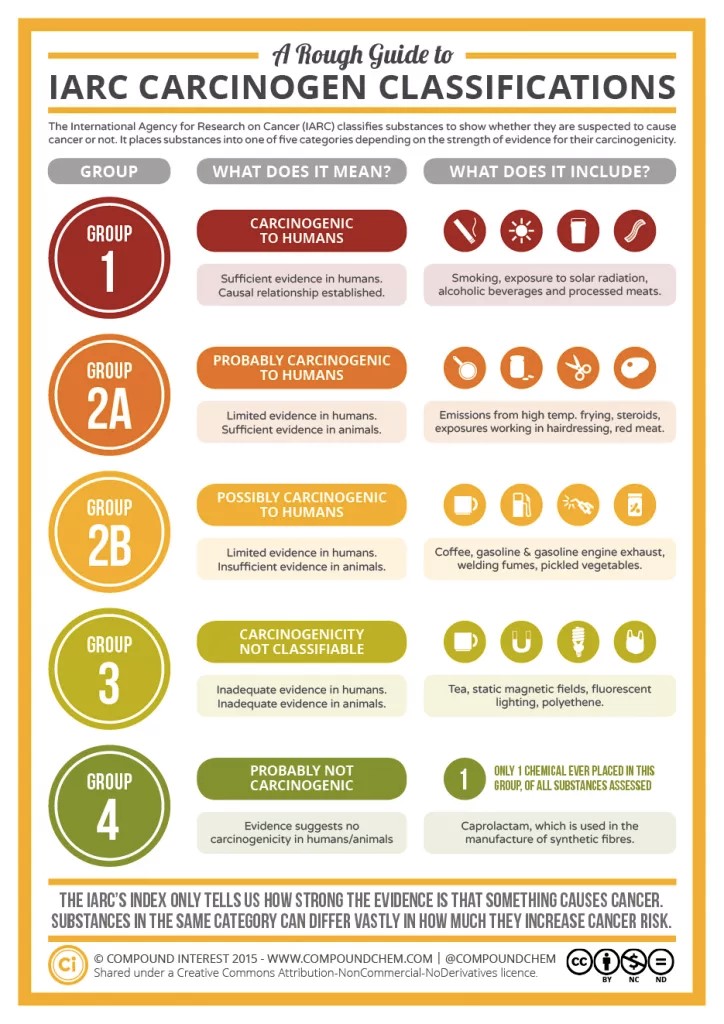What is IARC?
The International Agency for Research on Cancer (IARC) is an independent agency within the World Health Organization (WHO) that engages international, inter-disciplinary experts to identify potential cancer causes and preventive measures. The agency has a particular interest in conducting research in low- and middle-income countries through partnerships and collaborations with researchers in these regions.
The agency places exclusive emphasis on the potential of causing cancer (“hazard”), such as from environmental and lifestyle factors, rather than considering actual disease causation (“risk”). To date, nearly 1,000 agents have been reviewed by IARC – and of these, only one was not linked by IARC to some sort of increased cancer risk. IARC reviews these agents through its Monographs Programme.
What do IARC’s ratings mean?
IARC classifies potential carcinogens in five categories, ranging from carcinogenic (Group 1) to probably not carcinogenic (Group 4).
The classifications are assigned based on the potential for cancer risk rather than the likelihood that cancer can result from the exposure to the agent.
So, IARC’s ratings are based on studies that cite potential links to cancer, but not on research that demonstrates the degree of actual risk. As a matter of policy, IARC also assigns greater weight to results that cite a cancer link even when research showing no link comes from more scientifically rigorous studies. This can lead to confusion and misunderstandings for consumers, as resulted from IARC’s recent announcement on bacon.
For more information on each of these classifications, visit IARC’s frequently asked questions.

What has IARC said about coffee in the past?
IARC last reviewed coffee in 1991. At that time, the agency based its assessment on a few tentative studies citing a cancer link without actual causative evidence, and assigned a “2b” rating to coffee.
Why is coffee being revisited now?
IARC periodically revisits compounds in order to consider new findings.Coffee in particular has accumulated a huge amount of health-related research over the last 25 years. An overwhelming majority of that research has found positive links between coffee and lowered risk and incidence of disease.
What has the scientific literature said about coffee and cancer?
For more than fifteen years, the scientific literature on coffee, caffeine and other constituent compounds from independent laboratories and universities worldwide has been almost exclusively positive. Notably, that literature includes numerous findings linking coffee to a reduced risk of cancer. Particularly strong has been the evidence establishing coffee’s protective effect on the liver, and its reduction of the risk of cirrhosis, fatty liver disease and cancer, even among those at higher risk for these diseases. Also strong is the research confirming a reduced risk of colorectal cancer and certain cancers of the breast, endometrium and cervix. Coffee has also been associated with a significant reduction in the risk for developing type 2 diabetes, as well as protection against Alzheimer’s disease, Parkinson’s disease, early cognitive decline, gallstones and other maladies.
What does the upcoming IARC review mean for the coffee industry?
Despite the overwhelming body of positive health findings on coffee and health since 1991, it is virtually impossible to anticipate IARC’s review outcome. By policy, the agency looks for any evidence of potential risk and ignores any research that confirms health benefits of an agent it is studying or and also rejects countervailing evidence, no matter how strong, of the agent’s cancer prevention properties.
Regardless of outcome or the rating assigned by IARC, there tends to be media coverage surrounding IARC decisions, which associates the agents that are studied with cancer.
What has the NCA done to address the upcoming IARC review of coffee?
The NCA, with expert input from its scientific advisory group, tracks and analyzes all scientific literature on coffee and health. This has been a starting point for
a more focused review of the literature and topics likely to be studied by IARC. In addition, the NCA has retained an official “industry observer” to participate in the IARC meetings.